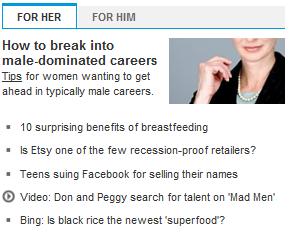Stephanie L. and Amie A. both sent in screen shots of the MSN tabs “for him” and “for her.” It’s not particularly surprising that MSN segregates its content by sex, but the gendered themes were interesting, especially given that Stephanie and Amie captured two moments in time.
First, notice that the information MSN chose as relevant to him is almost always leisure related:
The two lists above include how to build a man cave (where men escape daily responsibilities), the new Nikes, technological innovation and great inventions to read about, sports news, dating advice, and wacky stories about cocaine, $100,000 dollar bills, catching lobster, and urine. Except for a non-leisure-related, health story, all are either about leisure activities or a way to provide leisure with wacky, weird or fun news.
What about for her?
Her stories are about work (male careers), sexual harassment, babies (breastfeeding and baby talk), teenagers, the economy, and food (superfoods and allergy labels). The video on wildlife, the story about Chelsea Clinton, the piece on Mad Men, the new hospital gown design (???) can be interpreted as leisure-related in that they’d be fun to read.
Overall, then, the material aimed at men is almost entirely related to leisure, whereas the material aimed at women is heavily tilted towards her responsibility for work and the family and serious topics like sexual harassment and the economy. Perhaps MSN knows what it’s doing. In fact, men do have more leisure time than women. So this is a structural problem related to how we organize work and family, as well as a cultural problem in how we represent and relate to men and women.
Lisa Wade, PhD is an Associate Professor at Tulane University. She is the author of American Hookup, a book about college sexual culture; a textbook about gender; and a forthcoming introductory text: Terrible Magnificent Sociology. You can follow her on Twitter and Instagram.




Comments 6
Anonymous — September 16, 2010
Hm. Why are work and family necessarily negative, though? Maybe it's because I'm a woman (!), but I'd actually prefer working or spending time with my kids to reading wacky news stories about urine, most of the time.
pg — September 16, 2010
Perhaps the groper in "Man sentenced for groping wife's delivery nurse" was trying out the tips from "How to win over any woman."
Kevin Snelson — September 16, 2010
This is one of those moments where we see opinion (in my opinion [pardon the play on words]) becoming less relevant than the social implications tacitly involved here. Regardless of what one's interest is, whether one is male or female is irrelevant. These descriptions reflect societal roles, and again 'tacitly' suggest something about the prospective audience. Why would I then conclude opinion is less relevant?-Because these are designed to do one thing, attract people (prospective viewers) who will then be exposed to the plethora of banners and advertisements which are channeling capital into the media. Ultimately these adds were placed here to simply coax viewers into viewing, and these are believed to be of 'average' (right or wrong as that may be) appeal by the human resource wranglers working in the media. These are considered 'ideal' topics in the socially constructed 'ideal' world which we call modernity.
jennifer — September 17, 2010
the way these things work (this was my job before) is that we follow clicks by age and sex when that info is available (as a signed in msn messenger or google user for example ur account basic age/sex info is used). if it looks like men click or "car" and "technology" links, then YES, we will offer them such stuff. if women click on health-topics and entertainment, then that shall be offered to them more and more. sometimes other topics are offered to see if perhaps men could now be into traveling or health, but if the clicks are low, then it makes sense to pull back.
so basically, our own behavior (the majority's behavior...) affects what is offered to us at the end. all online businesses -especially the big ones- follow in great detail what the users do and try to target the content as well as possible. it should make both parties happy altho of course it wont please every single one but again - majority. if click numbers get higher that means the links are good, lets keep on that track, if not, lets try something else.
there doesnt need to be hidden stereotype-thinking in offering health/family/whatever links to women, i offer users whatever links they have been showing interest in. of course this could be a vicious circle of women having been taught and grown into the idea that they SHOULD be into health and family stuff, but a website cant just change that for us. if i try offering car-stuff to women and turns out they LOOOVE it, and clicks double, then hell, everyone is happy and i might get a raise! unfortunately women are still not into cars and sports. and if in the entertainment section Madonna-news are more popular (by clicks) than Jennifer Lopez-news, i will try to push in more Madonna-news when they are available.